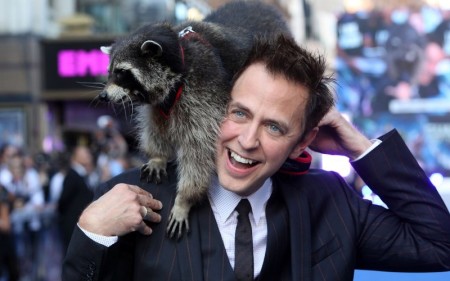So yesterday was interesting. I gave you four trailers and asked which ones you’d go to the theater and pay for. The clear winner was The Martian, the biggest piece of Intellectual Property on the list. The reason I find this interesting is because screenwriters are always complaining about the lack of original ideas available at the cinema and how studios keep adapting material from other mediums. Which is what The Martian is.
Therefore, today’s question is this. And I want you to think hard about it because, if you’re paying attention, your answer should inform you what kind of script to work on. What is a spec movie idea that you’d actually go out and pay to see? Or, if that’s too general, what kind of movies are they not making at the moment, that you would DEFINITELY pay 12-15 bucks for? If you can answer that question, and a lot of people agree with you (with upvotes), you should bust open Final Draft and start writing.
I don’t have much to say at the moment. I’m too busy sucking in the fresh vacation air. But to get you guys talking, here are four trailers that are hotter than a freshly baked pop tart. What are your thoughts? Which ones will you definitely go see in the theater? Which will you wait to hit digital? Which will you not watch even if someone threatens to shave off your skin with a potato peeler? We always talk about concept and what drives people to go pay 12 bucks at the box office. Well, make your predictions and let us know what you think will DEFINITELY be a hit… or a miss!
I hope all of you are getting some writing done, dammit. But in case you need to procrastinate, the topic du jour is Max Landis’s movie, “American Ultra.” The film didn’t do well on its opening weekend, finishing with 5.5 million bucks and a 48% Rotten Tomatoes score. I think they were hoping for Zombieland-like numbers (24 million bucks – 90% RT score).
Now I sympathize with ANYONE who has to go through an opening weekend. They are, quite honestly, one of the most fucked up masochistic business endeavors anyone could subject themselves to. You spend 3-10 years writing a script, looking for financing, finding stars, trying to get a green light, making the movie, cutting it together in post… all to see how it does between 3pm and 10pm on a Friday evening. Because it’s at that moment when you know whether you have a hit or a bomb. It’s an insane way to live your life – to engage in a business plan like that.
And because of that, when something does go bad, everyone involved in the project buries their head. But Max Landis, the tweeter of all tweeters, jumped right in and owned up to the failure. Or did he? I’m not sure if he’s blaming this movie on himself or the general population. Here’s what Landis tweeted:
So here’s an interesting question: American Ultra finished dead last at the box office, behind even Mission Impossible and Man From Uncle…American Ultra was also beaten by the critically reviled Hitman Agent 47 and Sinister, despite being a better reviewed film than either…which leads me to a bit of a conundrum: Why?
American Ultra had good ads, big stars, a fun idea, and honestly, it’s a good movie. Certainly better, in the internet’s opinion, than other things released the same day. If you saw it, you probably didn’t hate it. So I’m left with an odd thing here, which is that American Ultra lost to a sequel, a sequel reboot, a biopic, a sequel and a reboot. It seems the reviews didn’t even matter, the MOVIE didn’t matter.
The argument that can/will be made is: big level original ideas don’t $. For the longest time, my belief was that the 80s/90s were the golden age of movies; you never knew what you were going to get. Am I wrong? Is trying to make original movies in a big way just not a valid career path anymore for anyone but Tarantino and Nolan?
That’s the question: Am I wrong? Are original ideas over? I wanted to pose this to the public, because I feel, put lightly, confused. I feel like I learned a lesson, here, but have no idea what it is. I once joked “there’s only so many times people will go see Thor 2.” Sorry to be kind of a downer guys. It’s just a little frustrating to see John Cena squash Kevin Steen. Metaphorically.
Landis makes some good points. But there are a few he’s maybe twisted in his favor. Did American Ultra have “big stars?” Is it a “good movie?” Was this even a good idea? I think you limit yourself with the “Dude, I’m so high” crowd, but Pineapple Express road that subject matter to riches. It’s sad because this was one of the movies in my “Please Save The Day Specs” post. What do you guys think? Is what Landis is saying legitimate? It certainly hits on a lot of things we’ve discussed here before.
Hey guys. I am out of the office until Tuesday, the day after Labor Day (so September 8th). Lots to catch up on with Scriptshadow 250 entries and I need some extra time to pull it off. The good news is, I’m going to try and send a newsletter out soon. Also, I’ll try and update something small every day.
Today’s thought of the day comes from James Gunn, director of Guardians of the Galaxy. In this Facebook post, he talks about what kept him from experiencing success for a long time, and what the eventual solution was. In short, finish what you start. Read it all here and feel free to discuss it in the comments. Have a great Monday everybody and get some writing done!
I don’t even know how I’m writing this. With absolutely zero to watch, I made the mistake of renting Aloha. This movie is beyond incomprehensible. There are scenes that defy cinematic explanation. Bradley Cooper howls out the window like a wolf in a desperate bid by Crowe to recapture the magic of Jerry Maguire. The multiple love stories here are uncomfortable. 70 minutes in and there’s still no plot. Emma Stone may have to give in her SAG card after this. Oh man, this is brutal. I’m willing to bet that at least two amateur scripts from this week’s pile are better. So dig in and let’s find them!
Title: Jesus Christ: Witch Hunter
Genre: Action Comedy/B-Movie
Logline: In a world where witches have all but eradicated witch hunters, the final hunter is brutally murdered when the most powerful hunter in history, Jesus Christ, returns to prevent the witches from resurrecting an ancient, powerful witch who will destroy the world and enslave mankind.
Why You Should Read: Jesus Christ: Witch Hunter is a high octane, action fuelled, comedy, b-movie. JCWH is ridiculous. It’s ‘Machete’ meets ‘Wolfcop’. It’s big, it’s bold, it’s bloody and it’s absolutely bonkers. This is a popcorn film… not in the $200 million type Hollywood sense, but in the absurd, outrageous and blasphemous sense. I’m pretty sure this is the type of film the Vatican would abhor, condemn and then ban, thus doing most of the major marketing the film needs to succeed. Anyway, if you choose to read it, enjoy.
Title: Underneath
Genre: Contained Horror Thriller
Logline: A routine maintenance call goes awry when an explosion traps a public works crew underground with a mysterious symbiote that was released from hibernation.
Why You Should Read: Every review I read, Carson harps on the importance of urgency, goals, purpose, and a BIG story. I’ve tried to wrap my mind around what it means to create a story with those paramaters. While trying to mastermind a scenario that gives characters goals to achieve and the motivation to get there, I remembered a script I wrote a few years ago. “Underneath” is boiled down to those simple ideas. A group of maintenance workers are trapped underground after an explosion. Their goal is to get back to the surface. The urgency to get them there comes from an entity released after the accident. But as they race for freedom, the organism hunts them down. And best of all…it is all contained to the sewer. I would love to get the community’s feedback.
Title: Sign of Four
Genre: Spy/Mystery/Action/Thriller
Logline: After a senior intelligence agent dies under mysterious circumstances, three genius-level private spies become engulfed in a mole-hunt within their organization.
Why You Should Read: This script is very relevant in the sense it talks about the intelligence community’s growing dependence on private contractors; that grey area of espionage. I’m not a card-carrying liberal, but I feel like too much leeway to private intelligence companies can be a disaster.
Title: The Hindenburg Alien
Genre: Sci-fi
Logline: When a young man serving on the zeppelin Hindenburg discovers that a deadly, shape-shifting alien is hidden on board, he must defeat it or the girl he loves will suffer a fate worse than death.
Why You Should Read: I already sent you two of my other scripts for the Scriptshadow 250 contest, but what you wrote about the lack of big idea scripts inspired me to send you my biggest idea script. With its love story on a doomed vessel coupled with an alien which can assume the form of anyone it devours, it’s like TITANIC meets THE THING… I worked hard to make the script as easy to read as possible (no paragraph over 2 lines, only 97 pages) and to keep it moving and entertaining. If you’ll like it I’d really love for you to come on board as a producer!
Title: Small Slices
Genre: Horror
Logline: A strange old man tells scary campfire stories to two young boys. But who is the man, why are the boys in the stories and where are their parents?
Why You Should Read: Early in the year, you wrote a couple of posts, the gist being – You want to stand out in the current spec market? You need to take risks. So, I sucked up that advice, threw caution to the wind and the result is this very different little horror script. It takes the sort of structural and narrative risks I normally wouldn’t have the guts to try. I’d love it if this could find a place on AOW so the Scriptshadow community could let me know if the risks paid off or should I go back to channelling my inner Blake Snyder?





